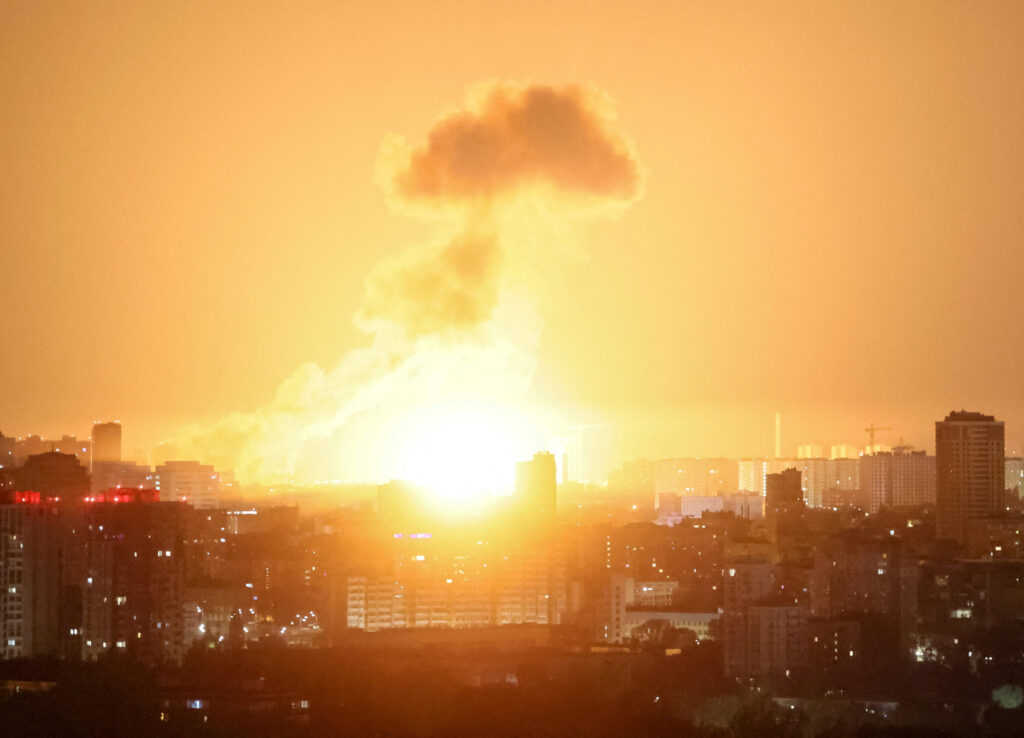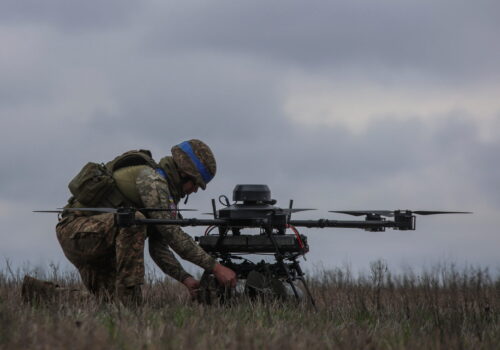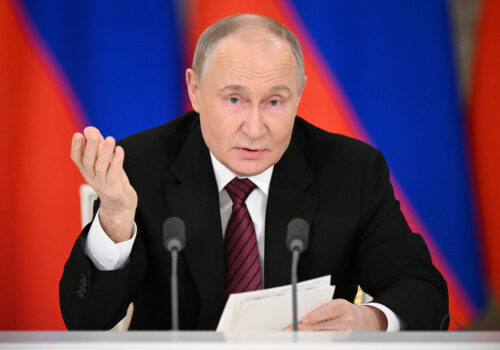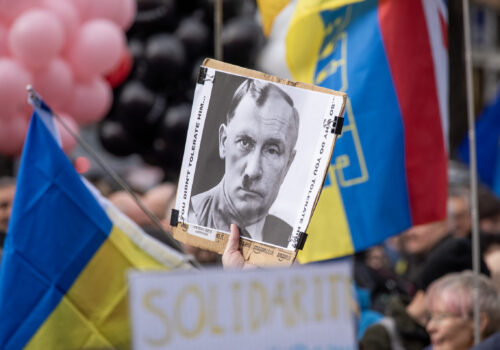Editor’s note: This article was updated on May 16, 2025, to include additional context about different types of crimes against humanity.
While international attention focuses on the US-led effort to initiate peace talks between Russia and Ukraine, Moscow is dramatically escalating its aerial attacks on Ukrainian civilians. During the first twenty-four days of April, for example, UN officials verified 848 civilian casualties due to Russian bombardments, representing a forty-six percent increase over the same period in 2024.
Russia’s aerial offensive is a daily feature of the war that aims to terrorize the civilian population and render large parts of Ukraine unlivable. By bombing cities and energy infrastructure, the Kremlin hopes to force millions of Ukrainians to flee the country and break the will of the remaining residents to resist. Any future peace deal that sidelines this reality and fails to hold Russia to account would erode international law and set a disastrous precedent for future armed conflicts.
For the past one and a half years, the International Human Rights Clinic at Harvard Law School and the International Partnership for Human Rights have documented and analyzed Russia’s aerial attacks in Ukraine. This research is based on extensive fieldwork, witness interviews, open-source intelligence, and forensic analysis.
After reviewing hundreds of Russian drone and missile strikes, researchers narrowed the focus down to twenty-two key attacks and identified two patterns that illuminate their impact: Attacks on energy infrastructure and on densely populated areas. The legal memorandum resulting from this work concludes that Russia’s bombing campaign amounts to the crimes against humanity of extermination and persecution.
Stay updated
As the world watches the Russian invasion of Ukraine unfold, UkraineAlert delivers the best Atlantic Council expert insight and analysis on Ukraine twice a week directly to your inbox.
For three consecutive winters, Russia has bombed Ukraine’s energy infrastructure in a bid to deprive the civilian population of access to heating and electricity at a time when the days are short and temperatures are typically well below freezing. These attacks have had a devastating impact on the Ukrainian power grid, with around half of Ukraine’s entire prewar energy-generating capacity destroyed by summer 2024.
As well as targeted attacks on civilian infrastructure, Russia has also launched waves of drones and missiles at Ukrainian towns and cities throughout the invasion, causing widespread destruction and loss of life. There have been a number of particularly deadly attacks in recent weeks, including a ballistic missile strike on a playground in Ukrainian President Volodymyr Zelenskyy’s hometown, Kryvyi Rih, that killed eighteen people including nine children. On Palm Sunday one week before Easter, Russia launched a targeted strike on Sumy city center as civilians made their way to church, leaving thirty-five dead.
In addition to killing and injuring civilians, Russian aerial attacks also create untenable living conditions for the wider civilian population. They leave people traumatized and fuel intense feelings of insecurity, while disrupting access to heating, power, water, healthcare, and other essential resources.
While estimating the true toll of these attacks is challenging, the number of displaced Ukrainians indicates the sheer scale of the humanitarian crisis. According to UN data from February 2025, Russian’s invasion has forced 10.6 million people to relocate, with 6.9 million recorded as refugees living outside Ukraine. Meanwhile, around 12.7 million Ukrainians are in need of humanitarian assistance, including nearly two million children.
Russia systematically and deliberately deprives civilians of objects essential to their survival and inflicts conditions of life calculated to bring about their destruction, which constitutes the crime against humanity of extermination. Statements by Russian officials, such as calls for Ukrainians to be left to “freeze and rot,” corroborate this conclusion.
Eurasia Center events

Russia’s aerial terror campaign, as well as the Kremlin’s actions in the occupied regions of Ukraine, have intentionally deprived Ukrainians of their fundamental rights to life, health, education, and culture, thus constituting the crime against humanity of persecution. The crime of persecution requires special discriminatory intent to target Ukrainians as a distinct group. This intent can be seen in Moscow’s branding of Ukrainians as “Nazis” who must be “destroyed.” such language underscores that Russia is attacking the very existence of Ukrainians. Targeted Russian attacks on educational and cultural facilities across Ukraine are further evidence of this intent.
Additionally, throughout the regions of Ukraine currently under Kremlin control, the Russian occupation authorities are reportedly enforcing russification policies that aim to extinguish any trace of Ukrainian national identity or statehood. Thousands of Ukrainian children have been deported to Russia and subjected to anti-Ukrainian indoctrination. The International Criminal Court in The Hague has issued an arrest warrant for Russian President Vladimir Putin in relation to the large-scale deportation of Ukrainian children.
Holding Russia accountable for the ongoing air offensive against Ukraine is particularly important as this form of prohibited total war, where everything and anything including vital infrastructure and civilian populations are targeted to achieve victory, looks set to return. Technological advances are transforming the modern battlefield to essentially include entire countries and their civilian populations. Against this backdrop, Russia’s use of long-range drones and missiles to terrorize Ukrainian civilians is likely a taste of things to come.
To date, no international tribunal has held individual perpetrators responsible for international crimes resulting from unlawful aerial attacks. The International Criminal Court has taken an important initial step by issuing arrest warrants against four senior Russian officials for their roles in attacking Ukrainian civilians and energy infrastructure, but further measures are needed.
Failure to hold Russia accountable today will fuel tomorrow’s wars and embolden Putin’s fellow autocrats to embrace similar tactics against civilian populations. It is vital to make sure long-term security is not sacrificed in order to reach some kind of compromise with the Kremlin to end the bloodshed in Ukraine. By focusing on accountability for Russia’s aerial attacks, the international community can set a meaningful precedent that could help protect civilians around the world for years to come.
Anastasiya Donets leads the Ukraine Legal Team at the International Partnership for Human Rights, an independent non-governmental organization. She was previously an assistant professor in the International Law Department at Yaroslav Mudryi National Law University in Kharkiv. Susan H. Farbstein is a clinical professor of law at Harvard Law School, where she directs the International Human Rights Clinic.
Further reading
The views expressed in UkraineAlert are solely those of the authors and do not necessarily reflect the views of the Atlantic Council, its staff, or its supporters.

The Eurasia Center’s mission is to enhance transatlantic cooperation in promoting stability, democratic values, and prosperity in Eurasia, from Eastern Europe and Turkey in the West to the Caucasus, Russia, and Central Asia in the East.
Follow us on social media
and support our work
Image: An explosion of a ballistic missile lights up the sky over the city during a Russian missile and drone strike, amid Russia's attack on Ukraine, in Kyiv, Ukraine. April 24, 2025. (REUTERS/Gleb Garanich/File Photo)




